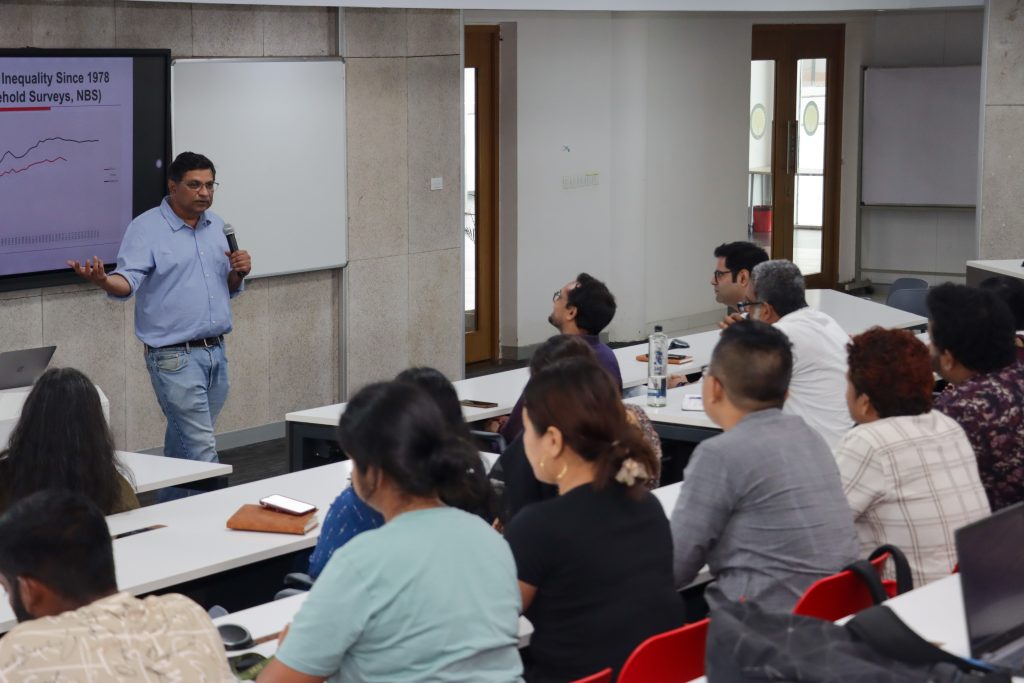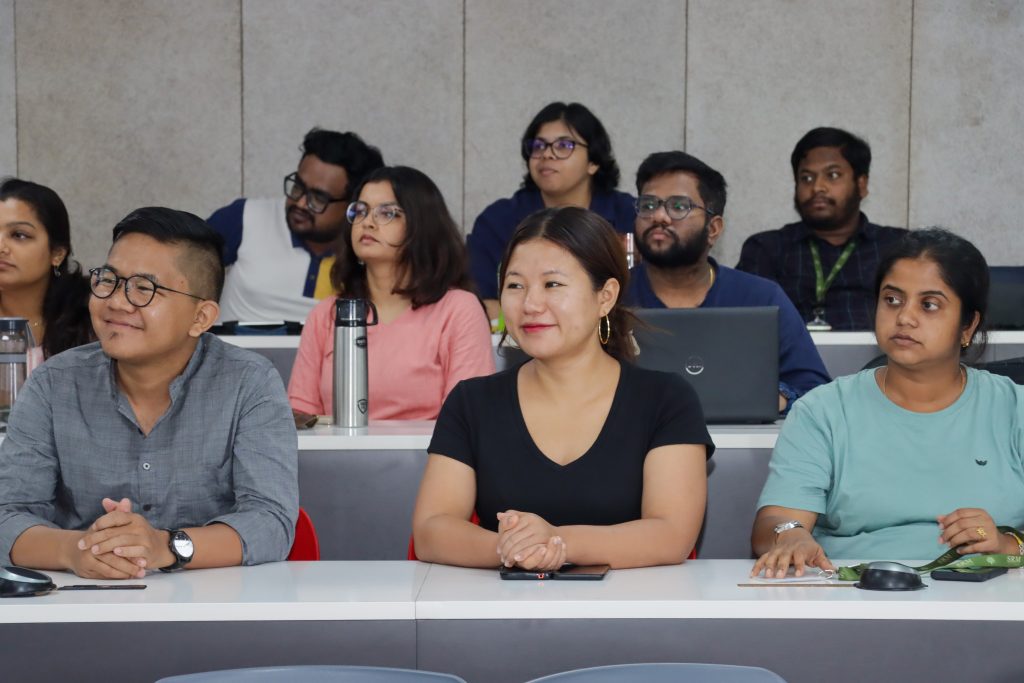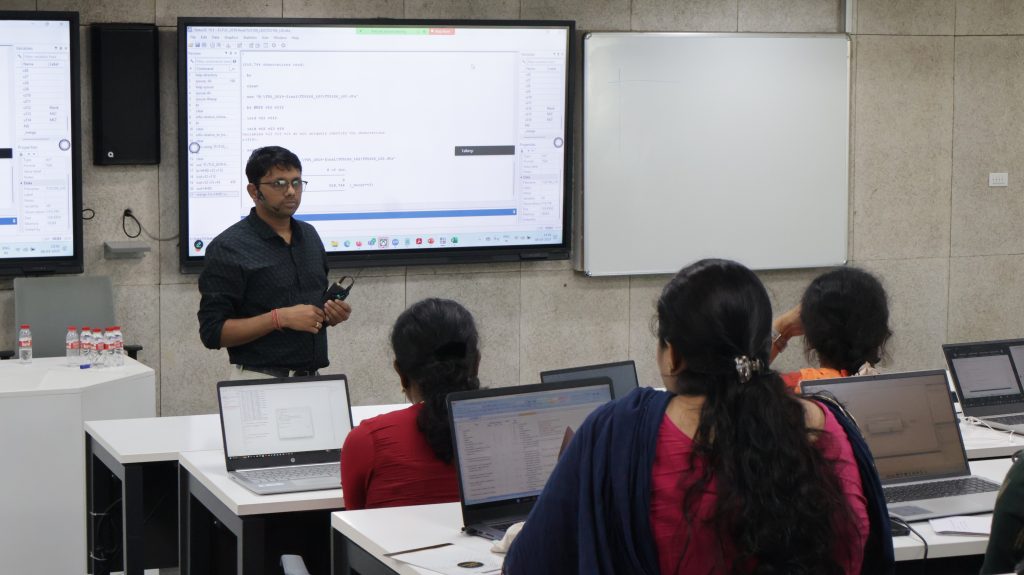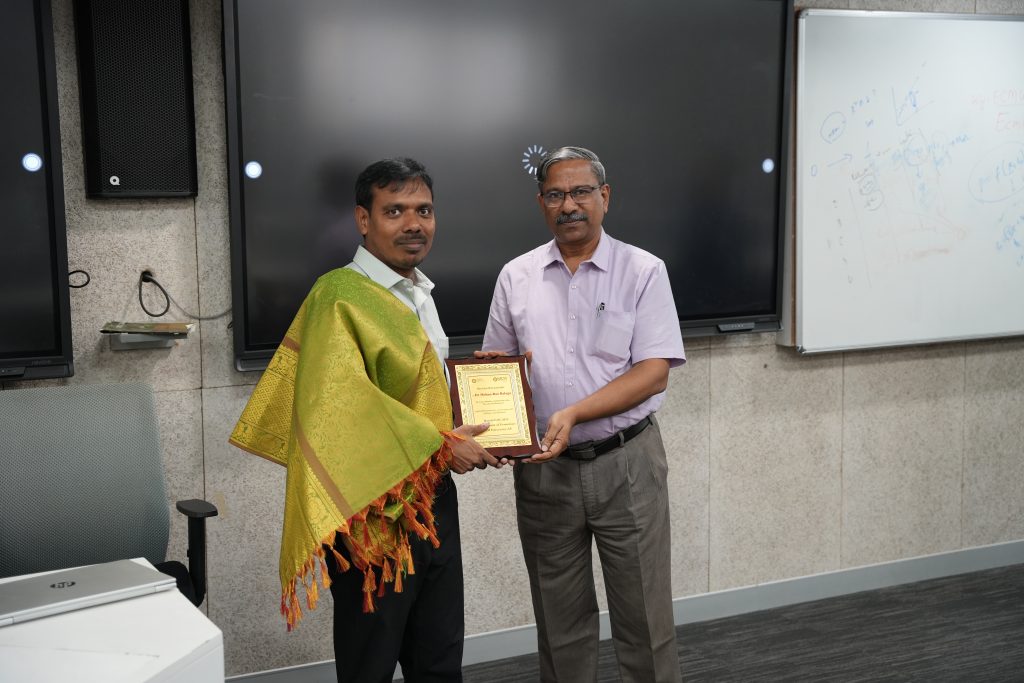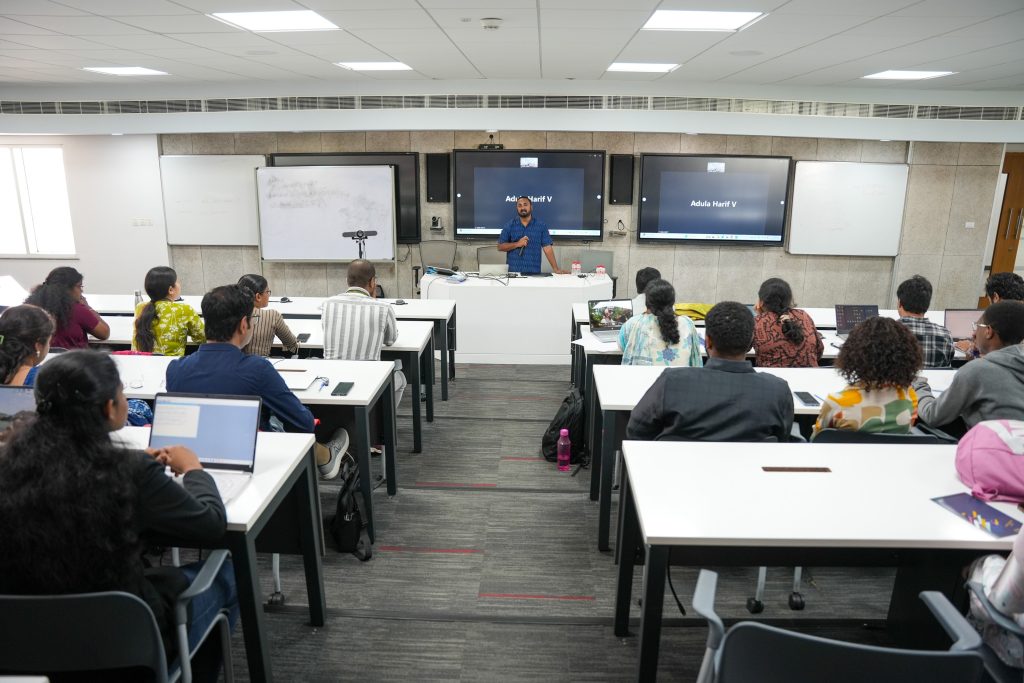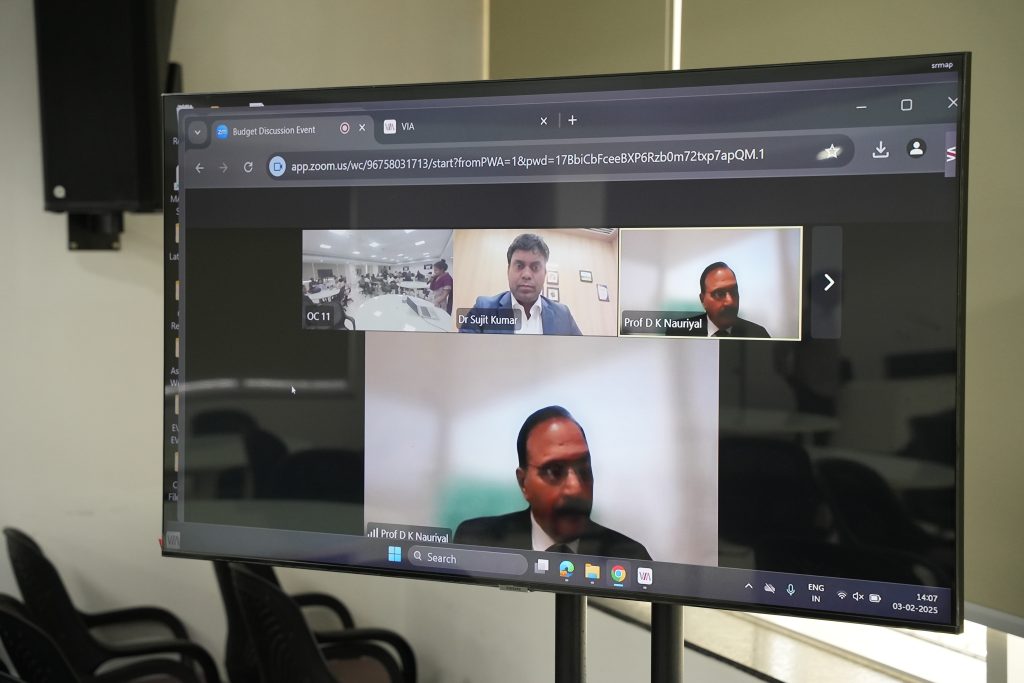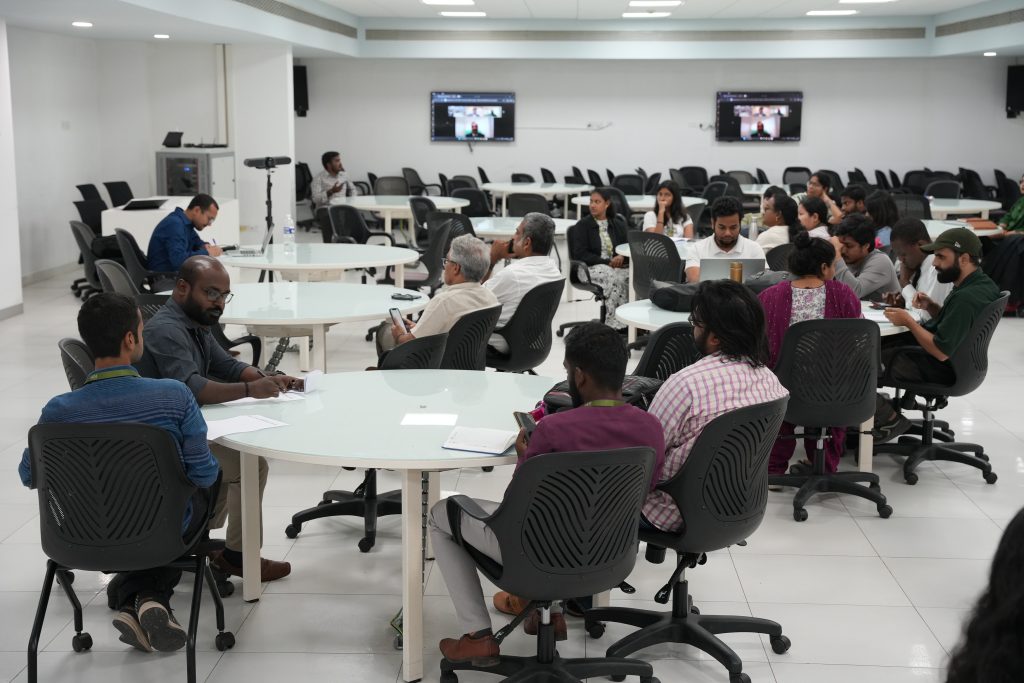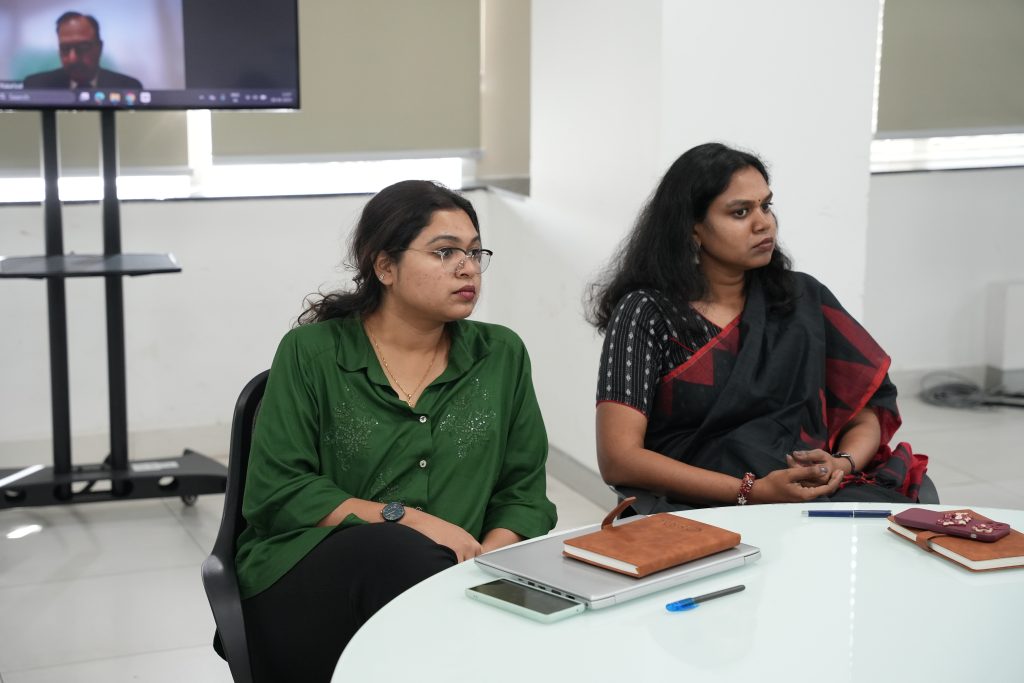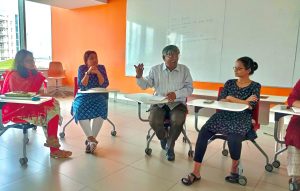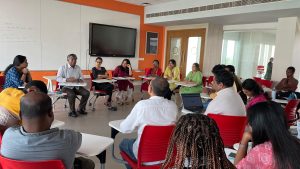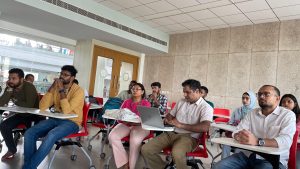“Class and Inequality in China and India” Talk by Prof. Vamsi Vakulabharanam
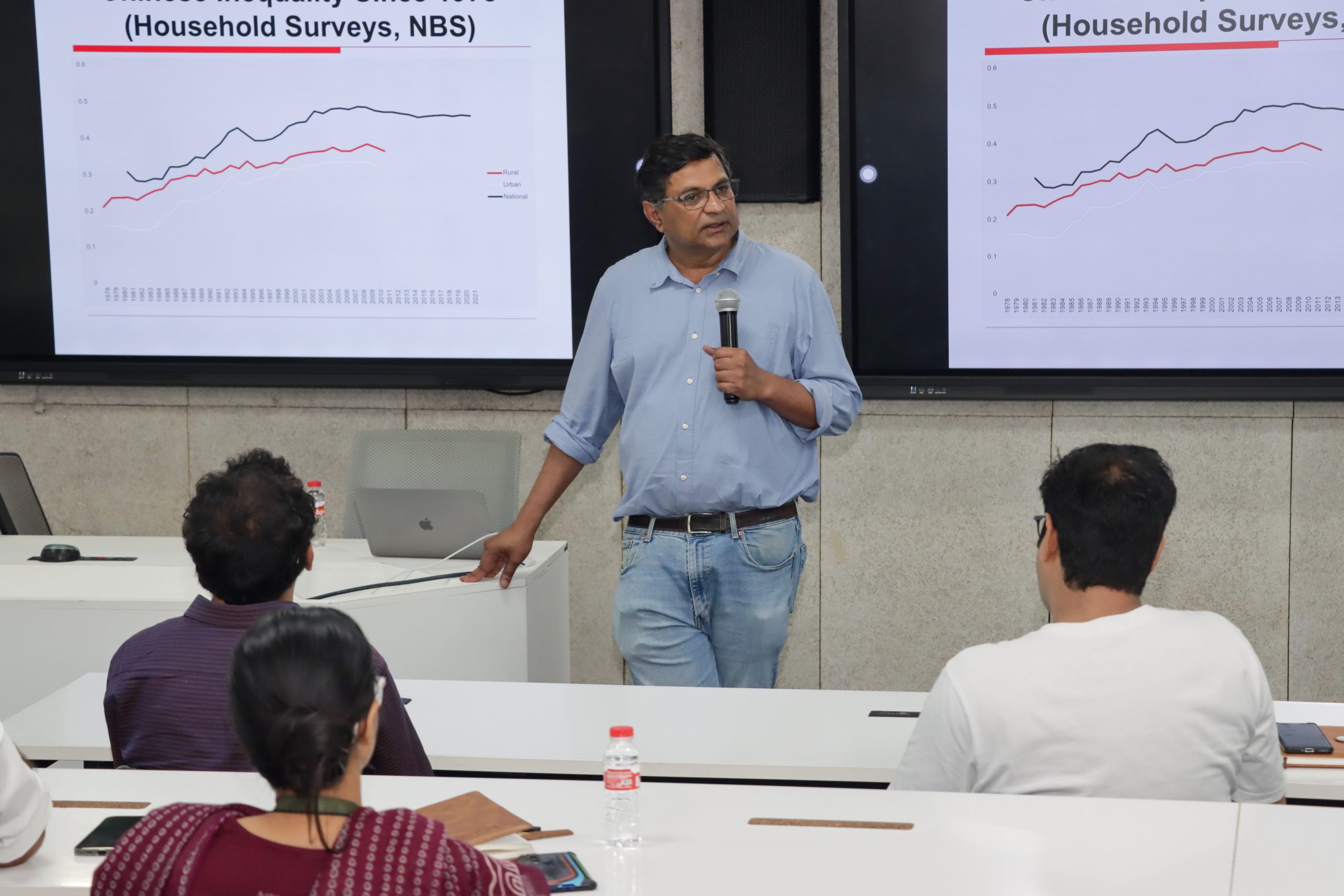 The Department of Economics hosted a talk titled “Class and Inequality in China and India” by Prof. Vamsi Vakulabharanam, Associate Professor of Economics at the University of Massachusetts Amherst on June 17th. Prof. Vakulabharanam, a former faculty member at the University of Hyderabad and City University of New York, has been associated with research institutions such as the Institute for New Economic Thinking (INET) and the India China Institute. He is a renowned scholar in the field of political economy, inequality and development studies with a focus on India, global capitalism and class-caste dynamics.
The Department of Economics hosted a talk titled “Class and Inequality in China and India” by Prof. Vamsi Vakulabharanam, Associate Professor of Economics at the University of Massachusetts Amherst on June 17th. Prof. Vakulabharanam, a former faculty member at the University of Hyderabad and City University of New York, has been associated with research institutions such as the Institute for New Economic Thinking (INET) and the India China Institute. He is a renowned scholar in the field of political economy, inequality and development studies with a focus on India, global capitalism and class-caste dynamics.
In his talk, Prof. Vakulabharanam presented key ideas from his recent book Class and Inequality in India (1950–2010), offering a comparative political economy perspective on India and China. His lecture offered critical comparative insights into the evolution of class structures and inequalities in China and India, two of the world’s largest emerging economies.
Drawing on empirical evidence and theoretical perspectives, the speaker examined the socio- economic trajectories of both countries and highlighted the implications of rising disparities for long- term development and social stability. He traced two distinct phases in the post-independence period:1950–1980, marked by low economic growth but a decline in inequality (forming the lower part of a U-shape), and 1980–2010, characterised by rapid growth under neoliberal reforms and policies but a simultaneous rise in inequality.
The lecture highlighted three main contributions of the book:
- A class-based analysis of inequality, especially novel in the context of China.
- An exploration of how India and China have transformed the world economy post-1950, and how global economic dynamics have, in turn, reshaped these countries.
- A theoretical framework for understanding within-country inequality.
Prof. Vakulabharanam also engaged with frameworks such as varieties of capitalism, French regulation theory, and comparative urban inequality (e.g., urban Gini coefficient analysis in Beijing and Delhi), offering a nuanced critique on ideas from thinkers like Thomas Piketty and Simon Kuznets and of global inequality discourse.
Concluding his talk, Prof. Vakulabharanam emphasised, “If China and India genuinely want to add something novel to the world order, they have to break free from the European model and find their own way of addressing inequality, climate change, and technological innovation.”
The session witnessed active participation from faculty members and research scholars from the Easwari School. Followed by a lively Q&A session, engaging participants in discussions around development policy, economic reforms, and the political economy of inequality. This academic event marked a valuable opportunity for the university community to interact with an international expert and gain deeper understanding of comparative development challenges in Asia.
- Published in Departmental News, Economics Current Happenings, Economics News, News
Two-Day Workshop on Applied Econometrics & Its Applications in STATA and R
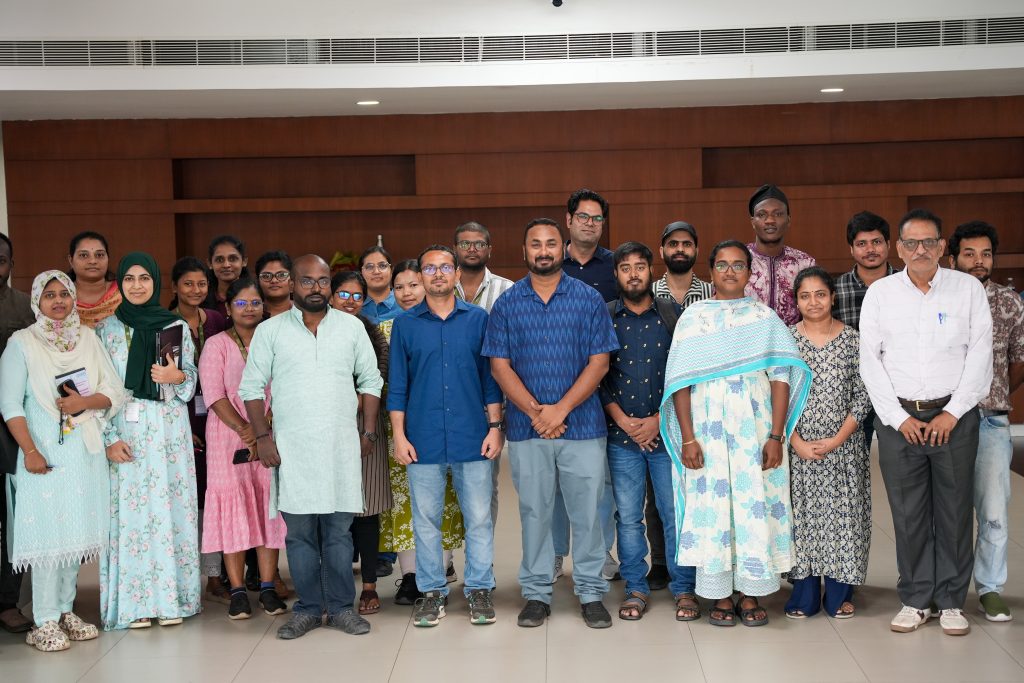
The Department of Economics at Easwari School of Liberal Arts successfully organised a two-day workshop titled “Applied Econometrics: Leveraging with Software and Databases” on March 7 – 8, 2025. The workshop witnessed the participation of approximately 40 attendees, comprising academicians, research scholars, and students from various institutions, including SRM IST, VIT-AP and Amrita University. The significant turnout reflected the keen interest in applied econometrics and the practical implementation of statistical software (R and STATA) for economic analysis.
The primary objective of the workshop was to provide a comprehensive understanding of econometric principles while emphasising hands-on training with statistical software such as STATA and R. Participants received practical exposure to key econometric techniques, including time series modelling, cross-sectional data analysis, and panel data estimation, thereby enhancing their empirical research capabilities.
The workshop featured four insightful sessions conducted by distinguished experts in the field of econometrics:
- Dr Anandarao Suvvari (IIT Goa) – Delivered an in-depth session on fundamental econometric techniques and their applications in STATA and R.
- Dr Mohan Rao Balaga (IIT Dharwad) – Provided a comprehensive analysis of time series methodologies, covering ARIMA, VECM, VAR, and ARDL models using macroeconomic and financial datasets.
- Dr Pratap C Mohanty (IIT Roorkee) – Delivered a session on cross-sectional data techniques, encompassing linear and non-linear models, instrumental variable (IV) estimation, and applications utilizing NSSO and large-scale survey data.
- Dr Vineesh Prakash (SRM University-AP) – Conducted an extensive session on panel data models, discussing Fixed Effects (FE), Random Effects (RE), Generalized Method of Moments (GMM), and dynamic panel models using CMIE ProwessIQ data.
The interactive nature of the sessions enabled participants to engage with the resource persons, deliberate on real-world econometric applications, and undertake practical case studies utilizing empirical datasets. The rigorous discussions and hands-on exercises significantly contributed to a deeper understanding of applied econometrics.
This two-day workshop proved an enriching academic initiative, equipping participants with essential econometric skills and strengthening their analytical capabilities in economic and financial data analysis. The positive feedback from attendees underscored the effectiveness of the workshop particularly in integrating theoretical knowledge with hands-on implementation.
- Published in Departmental News, Economics Current Happenings, Economics News, News
A Panel Discussion on Decoding the Budget 2025-26
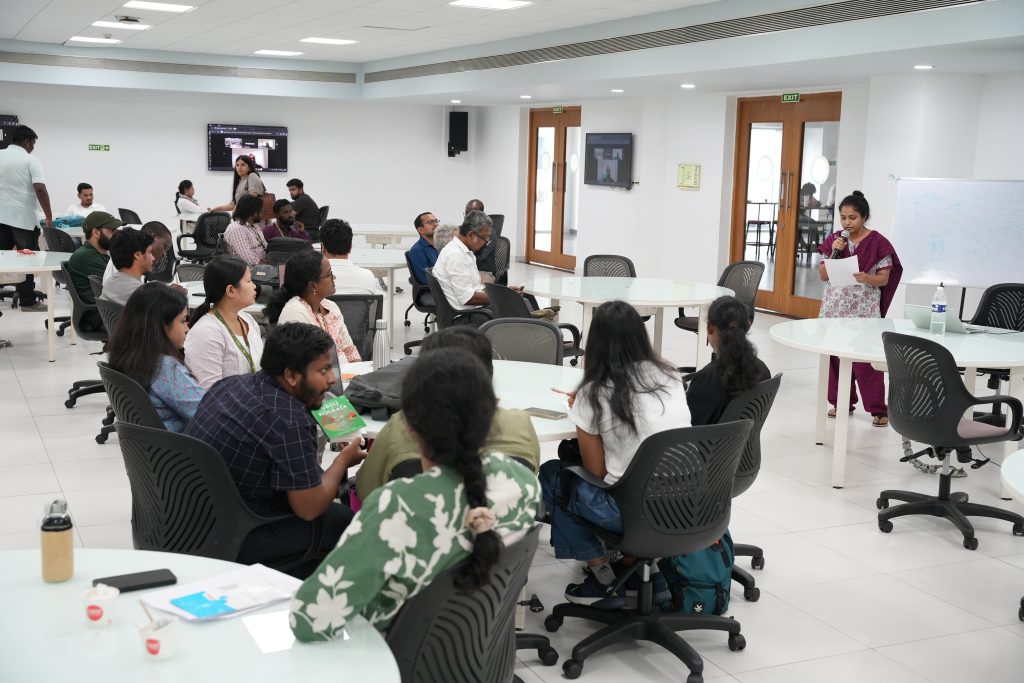
The Department of Economics at Easwari School of Liberal Arts organised a panel discussion titled “Decoding the Budget: Insights, Perspectives, and the Big Picture” on February 03, 2025. The event was designed to provide in-depth insights into the Union Budget 2025-26, focusing on fiscal priorities, economic implications, and sectoral impacts. The discussion brought together distinguished experts from academia and policymaking to analyse key announcements and their long-term effects.
The panel discussion featured three esteemed panellists:
– Prof. Vinish Kathuria (Director, Institute of Development Studies, Jaipur & IIT Bombay) – Expertise: Productivity Measurement, Economics of Regulation, and Environmental Economics.
– Prof. D K Nauriyal (Professor, Department of Humanities and Social Sciences, IIT Roorkee) – Expertise: International Trade, Development Economics, and Economics of Intellectual Property.
– Dr Sujit Kumar (Chief Economist, National Bank for Financing Infrastructure and Development – NaBFID) – Expertise: Banking & Finance, Infrastructure, and the Indian Economy.
The experts analysed the macroeconomic factors influencing the budget, such as inflation control, fiscal deficit management, and global economic trends. The panellists discussed the implications of the budget on critical sectors, including infrastructure, banking, environmental sustainability, and trade policies. The discussion highlighted significant policy changes to boost economic growth and social welfare initiatives. The Q&A session allowed participants to seek clarifications and gain deeper insights into budget-related policies and their long-term effects.
Students, faculty, scholars, and individuals interested in economic policy and financial analysis participate in the discussion. Participants also joined online as the event was in the hybrid mode.
The panel discussion on Decoding the Budget 2025-26 successfully gave attendees a clearer understanding of India’s financial and economic direction. The expert insights helped bridge the gap between budgetary announcements and their practical implications. Students, faculty, and policymakers benefited from the interactive discourse, enhancing their knowledge of economic policies and fiscal governance.
This insightful session emphasised the importance of informed economic discussions in shaping perspectives on national financial policies and governance strategies.
- Published in Departmental News, Economics Current Happenings, Economics News, News
An Insightful Lecture on Student Migration
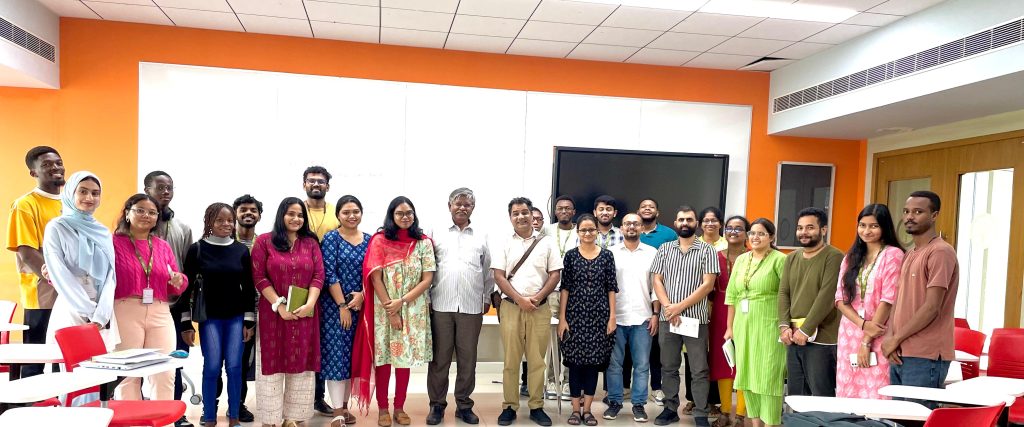
Prof. Irudaya Rajan, Founder Chair of the International Institute of Migration and Development and Distinguished Visiting Faculty at the Department of Economics, Easwari School of Liberal Arts, engaged with faculties, scholars and students on a compelling talk on “The Future of Student Migration” on November 22, 2024. Prof. Rajan delved into the crucial role of migration in shaping and redefining national demographics and offered valuable insights into internal and international migration trends, explaining their profound impact on labour markets, education systems, and policy-making. His talk sparked engaging debates and discussions, enriching the understanding of migration as a dynamic force in demographic change and national development.
During his visit, Prof. Rajan also interacted with faculty and students, discussing collaborative research projects and sharing his expertise. The session was a thought-provoking exploration of migration’s pivotal influence on global and local contexts, leaving the audience with much to reflect upon.
- Published in Departmental News, Economics Current Happenings, Economics News, News, Uncategorized
Scaling Heights: Nilesh Bags an Internship at RBI

The Department of Economics proudly announces that Mr Nilesh A, a third-year B.Sc. Economics (Hons.) student, has secured a highly coveted one-month research-based internship at the Reserve Bank of India, Mumbai. This internship is under the Department of Economic and Policy Research (DEPR).
“I am thrilled to share my experience of securing an internship at the Reserve Bank of India, a journey that was significantly supported by the resources and guidance provided by my university. I am grateful to all my professors at Easwari School of Liberal Arts at SRM University-AP for their unwavering support and encouragement. This internship is a pivotal step in my career, and I am excited about the future and eager to continue building on this incredible foundation,” stated Nilesh while expressing his gratitude for this once-in-a-lifetime opportunity.
Internships are remarkable opportunities to gain experience and exposure, build a strong network, and hone the skills you already possess. The Easwari School of Liberal Arts of SRM University-AP provides academic and research internships prioritising experiential and industry-based learning to help students cultivate a refined practical skillset.
Unveiling the Dynamics of Labour Market Outcomes
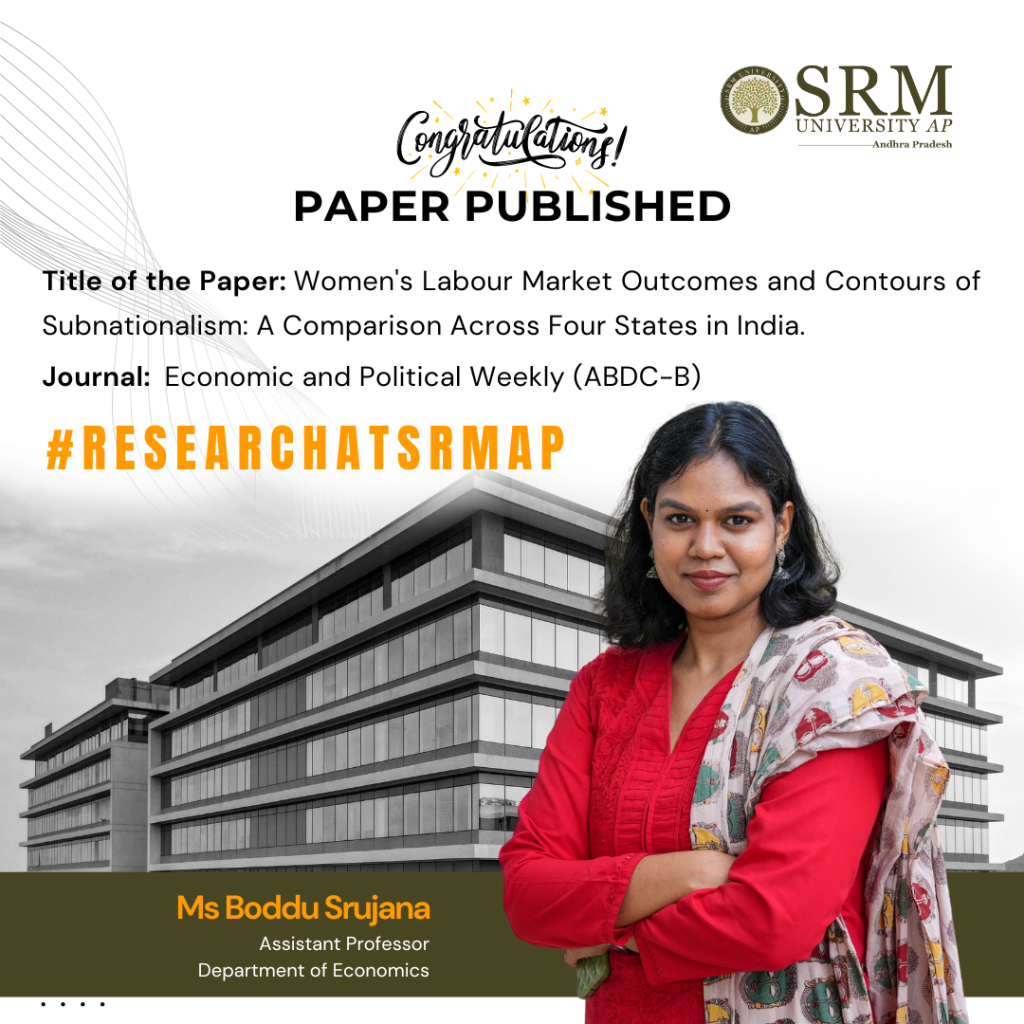
In the wake of the COVID-19 pandemic, societies across the globe were pushed into acute constraints, especially in the absence of employment security and consistency. In this regard, Dr Boddu Srujana, Assistant Professor at the Department of Economics through her research paper titled, Women’s Labour Market Outcomes and Contours of Subnationalism: A Comparison Across Four States in India, scrutinises the impact of the pandemic on women’s employment and thereby explores whether these outcomes were uniformly impacted or if they reveal variations attributable to the political dynamics within these states.
Read the exciting excerpt followed by the link to the article, featured in Economic and Political Weekly
Abstract:
Using, the Periodic Labour Force Survey data for 2018–19 and 2020–21, the article explores shifts in women’s employment outcomes pre- and post-pandemic across four Indian states. The article finds that the states with stronger subnational politics fare better in creating quality employment outcomes for women compared to their counterparts, even during times of crisis such as the recent COVID pandemic. This stands true even for women with disadvantaged social, economic and educational backgrounds.
Practical implementation of research and social implications:
The research highlights the effectiveness of governance and emphasizes social policies over time that can create better job opportunities for women, where they can secure against vulnerabilities even during challenging times such as crises. This leads to greater economic independence, reduces poverty, and promotes social equity.
Collaborators:
The research paper is co-authored with Anagha Tobi and Sipoy Sarveswar.
Anagha Tobi is an Assistant Professor at the Department of Humanities and Social Sciences, Mahindra University, Hyderabad. Sipoy Sarveswar is an Assistant Professor at the Department of Anthropology, Vidya Bhavana, Visva-Bharati, Santiniketan.
Future Plans:
As part of her future research projects in this area, Dr Srujana plans on studying the urban informal labour markets, urbanisation, the dynamics of informalisation, the future of work, and the impact of public policy on labour markets. She is eager to extend her work in these areas by engaging in collaborative research while also partnering with academic institutions, policymakers and NGOs, whereby she aims to contribute to the changing world of work and develop actionable insights that can inform policy and practice
Link to the article.
https://www.epw.in/journal/2024/23/perspectives/womens-labour-market-outcomes-and-contours.html
- Published in Departmental News, Economics News, News, Research News
Faculties Publish an Insightful Article on Political Manifestos and Labor Class
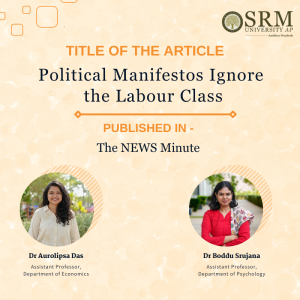 In a thought-provoking article titled “Political Manifestos Ignore the Labor Class,” Dr Aurolipsa Das and Dr Srujana Boddu, Assistant Professors from the Department of Economics, shed light on a critical issue that often goes unnoticed during election seasons. Their research delves into the disconnect between political promises and the ground realities faced by the labour class.
In a thought-provoking article titled “Political Manifestos Ignore the Labor Class,” Dr Aurolipsa Das and Dr Srujana Boddu, Assistant Professors from the Department of Economics, shed light on a critical issue that often goes unnoticed during election seasons. Their research delves into the disconnect between political promises and the ground realities faced by the labour class.
They critically examine the shortcomings of political manifestos, highlighting how they often overlook the interests and needs of the labour class. As India heads into another election cycle, Dr Aurolipsa Das and Dr. Srujana’s article serves as a wake-up call for policymakers. To bridge the gap between political promises and ground-level impact, evidence-based policies that prioritise the labor class are essential. It is time for political parties to move beyond rhetoric and take concrete steps toward meaningful progress.
Read the full article by clicking on this link to gain deeper insights into this crucial topic.
- Published in Departmental News, Economics Current Happenings, Economics News, News
Uncovering the Factors Influencing Income Inequality in Rural Indian Households: A Comprehensive Study
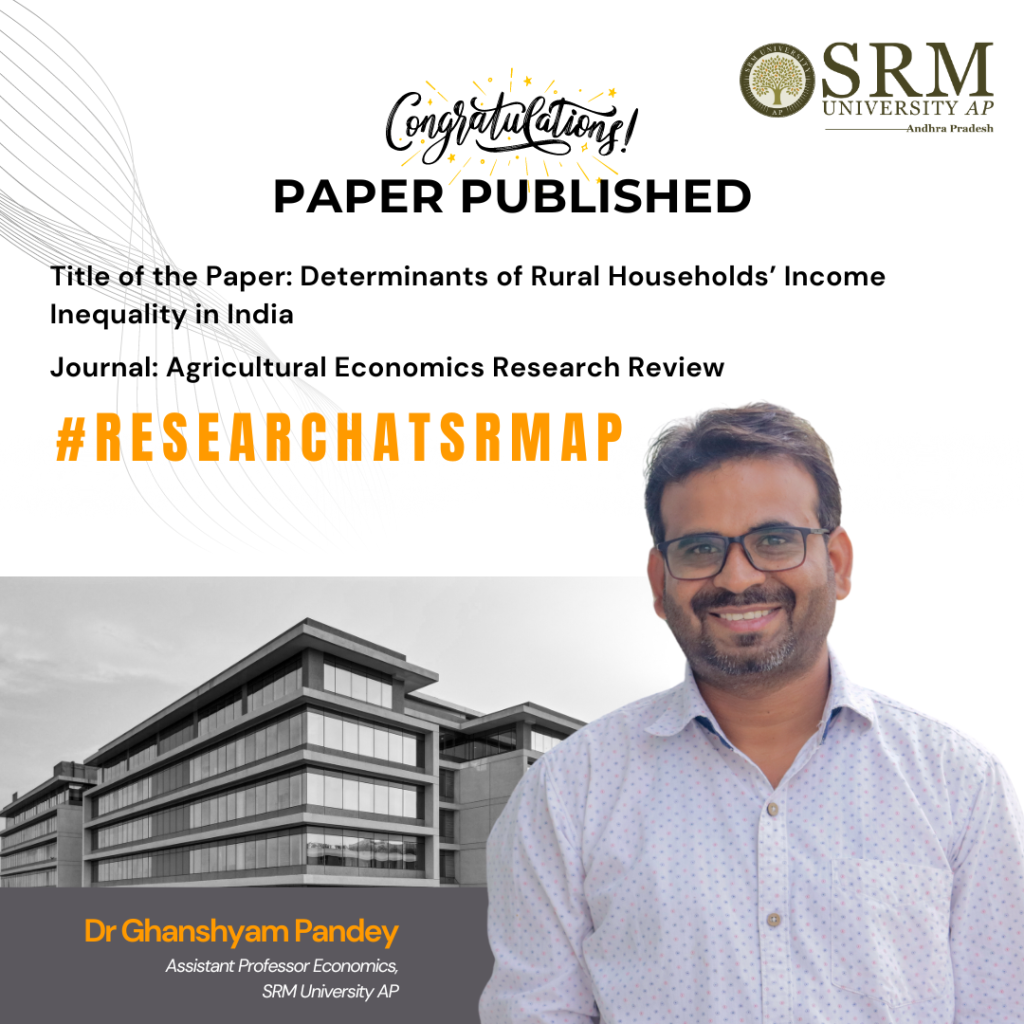
The Department of Economics takes immense pride in announcing the publication of the research paper, “Determinants of Rural Households’ Income Inequality in India” authored by Dr Ghanshyam Pandey, Assistant Professor. The paper has been published in the Journal of Agricultural Economics Research Review (ABDC-C), and has an impact factor of 0.19. Dr Pandey’s paper examines the factors that determine income inequality among rural farm households in India and discusses the implications of the findings for policymakers, practitioners, and researchers. The study highlights how addressing the identified factors could potentially reduce income inequality among rural farm households and improve the overall well-being of the rural population.
Abstract
This study has identified the drivers of income inequality in rural India using IHDS 2011–12 national-level survey. The inequality decomposition methodology developed by Fields (2003) based on a two-way regression methodology has been used. The study has modified the previous regression based inequality decomposition technique by accounting for diverse income sources and regimes as well as by effectively correcting for selectivity in the various income regimes. The CLAD model has been used to distinguish the determinants of income inequality in rural India. The study has indicated that income inequality in farm households can be attributed to the level of education, family size, caste/social group composition, and composition in land ownership and that family size and land ownership are instrumental primarily due to off-farm labour income. The study has shown that education is a significant factor in income inequality due to its impact on off-farm work income. The study has suggested that a continued increase in variability in land distribution may exacerbate income inequality in households in rural India.
Link to the Article
Pandey G and Devi B (2023). Determinants of rural households’ income inequality in India. (2024). Agricultural Economics Research Review, 36(2), 213-225. https://epubs.icar.org.in/index.php/AERR/article/view/150669

- Published in Departmental News, Economics Current Happenings, Economics News, News, Research News
Examining the Impact of Bifurcation on Agricultural Development in Jharkhand: A Comprehensive Study
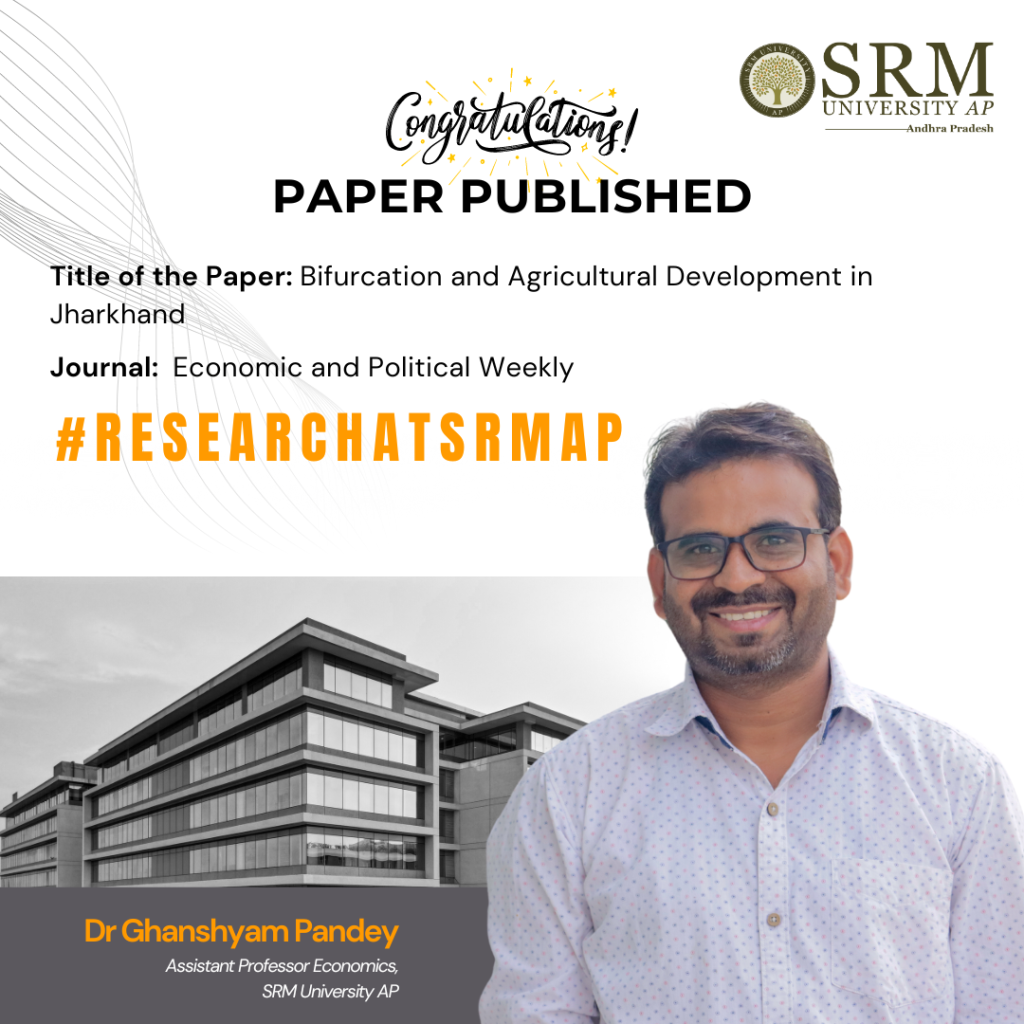
The Department of Economics is thrilled to announce the publication of Assistant Professor Dr Ghanshyam Kumar Pandey’s research paper titled, “Bifurcation and Agricultural Development in Jharkhand,” in Economic and Political Weekly. The paper delves into the developmental trajectory of Jharkhand following its bifurcation from Bihar in 2000 and examines the intricacies of agricultural development and the key determinants that have shaped its evolution post-separation.
Abstract:
The cropping pattern in Jharkhand has significantly changed from 2000 to 2016, with shifts from the cultivation of cereals to non-cereals. An increase in the crop area and diversification towards high-value crops have accelerated overall agricultural growth. Capital formation and better infrastructure facilities, along with improved fertiliser consumption and irrigation, will foster agricultural development in Jharkhand
Practical implementation:
This study shows the development path of Jharkhand after bifurcation from Bihar in 2000. The study deals with the process of agricultural development and determinants of agricultural development after its bifurcation.

- Published in Departmental News, Economics Current Happenings, Economics News, News, Research News
Dr Ghanshyam Pandey Invited as Guest Speaker at BITS Pilani, Goa
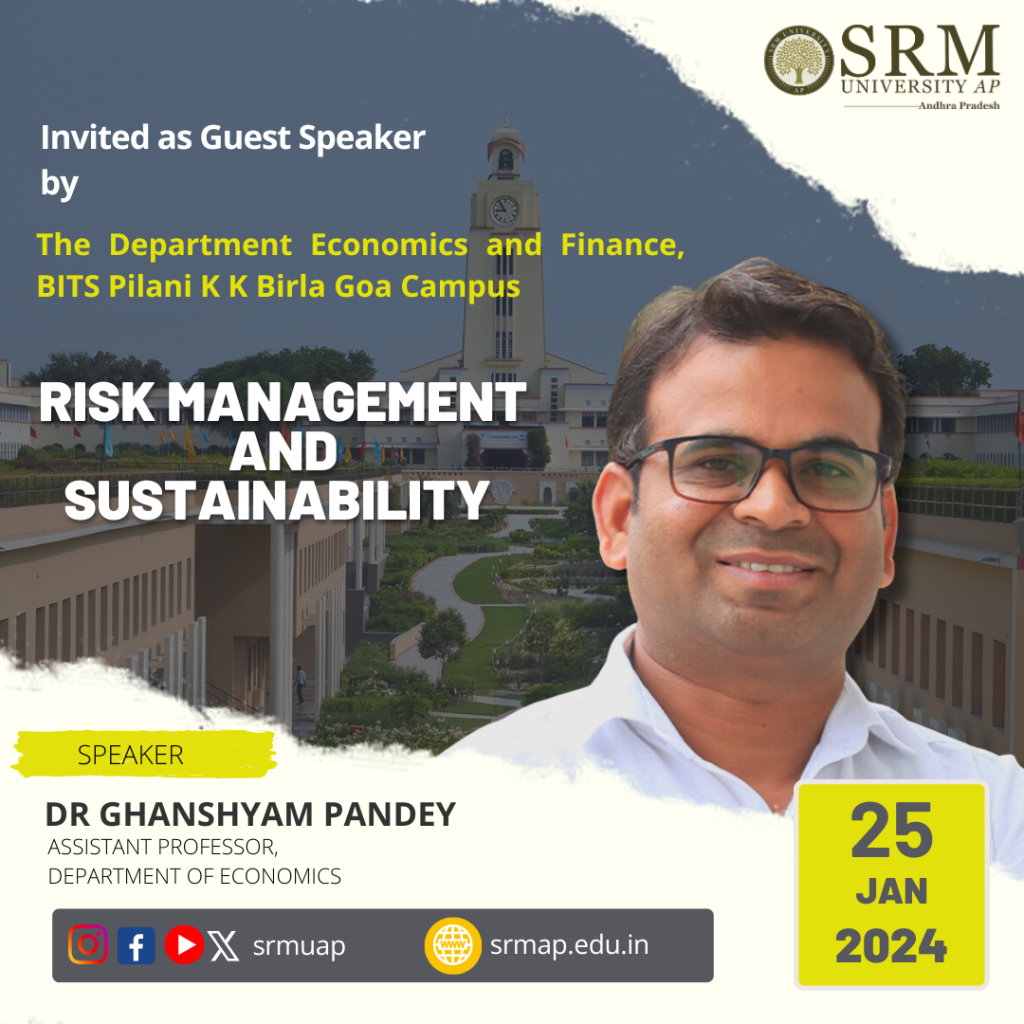
Dr Ghanshyam Pandey, an Assistant Professor at the Department of Economics, has been invited to deliver a talk on Risk Management and Sustainability on January 25, 2024, at the Department of Economics and Finance, BITS Pilani K K Birla Goa Campus.
Dr Pandey is a distinguished member of SRM University-AP’s teaching faculty and an accomplished economist with numerous publications to his credit. He has led several prestigious government-sponsored projects and is the Principal Investigator for the NABARD-sponsored project titled, “Tenancy and Credit: Exploring Facts below the Crust in AP”.
- Published in Departmental News, Economics Faculty, Economics News, News


